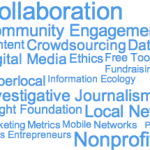Blog:
JA Resource Q&A: “Building a great community”

Disqus is a third-party commenting platform, created in 2007 because the founders felt comment systems hadn’t evolved from the Internet’s early years. Disqus says it helps a range of customers “[f]rom small blogs to massive websites … build active communities.”

Having the option to comment on anything posted online seems ubiquitous and universal. But, as publishers covering local beats know well, there are many choices happening behind the scenes that affect how people experience online conversation, contribute to it and come to develop relationships as part of an online community on a given site.
Your choices could begin with something as simple as selecting options in a Word Press theme. As you grow and refine goals for the comment section of your site, you may begin to look at software that allows for more nuance and networking.
To discuss the pros and cons of commenting tools and learn more about how online conversation is evolving, we invited Disqus VP of Business Development Ro Gupta to share his insight and expertise. Disqus is the largest commenting system on the web, reaching over 700 million people per month, according to the company. This conversation is part of our series showcasing JA-curated resources designed to offer practical tips and useful insights to increase your yield and deepen your success.
We tackled a lot of questions in the live Q&A with Disqus’ Ro Gupta. For example: What are the risks and benefits of upgrading your website’s comment system? As online conversation becomes more important, how can you leverage it to drive revenue? What can you do to improve the conversation experience, engage your audience and promote civility?
Building community
Andrew Marshall joined the discussion to ask Gupta about the role of a comment system in building community. “In order to maximize the value of a comment system like Disqus,” he asked, “is it necessary to have a community to start?”
“Be very present”
 Even though Disqus VP Ro Gupta is in the business of building and selling a comment platform, he says technology can only do half the job. “Even though we are a software company,” he says, “I still believe that software is only 50% at maximum of the equation.” The rest comes from the human curation, including clear rules and expectations, and managers willing to “be very present” in their own and other online communities. Gupta brings a range of experience from Disney, ABC News, TechnoServe and other companies to Disqus. He’s a New York resident but a diehard Philly fan.
Even though Disqus VP Ro Gupta is in the business of building and selling a comment platform, he says technology can only do half the job. “Even though we are a software company,” he says, “I still believe that software is only 50% at maximum of the equation.” The rest comes from the human curation, including clear rules and expectations, and managers willing to “be very present” in their own and other online communities. Gupta brings a range of experience from Disney, ABC News, TechnoServe and other companies to Disqus. He’s a New York resident but a diehard Philly fan.
Gupta touted Disqus as useful in building audience because visitors to sites using the platform can easily find content on other sites also using Disqus. But, he cautioned, upgrading your commenting system alone is not enough to increase site traffic or boost other key performance indicators. “Software is only 50% at maximum of the equation,” he wrote in the Q&A. “The rest is up to the site managers to have great content, commit to building a great community by being present both in their own comment discussion and others around the web.”
Takeaway: Build specific goals for content and commitment into any plan to upgrade your conversation platform and measure success.
How are comments and revenue related?
Our primary goal for this conversation was to explore different ways that upgrading your commenting system can directly or indirectly drive revenue. Citing a 2011 study, Gupta said high participation in conversation threads correlates to higher time spent and page views per visit.
He mentioned two ways higher participation can drive revenue: “For many sites, more page views means more advertising inventory. For others, more commenters means more registered users who are often the ones most likely to opt in to a paid service or product/event of some kind that the site may offer.”
While online ads are traditionally served through Google AdSense or other ad networks, Gupta said Disqus has developed an option for an additional advertising method called Promoted Discovery, which uses the content-referral feature of Disqus to share relevant content from advertising partners.
Takeaway: Connect the right dots to build revenue expectations into a comment system upgrade. Then track it to help assess the value of the investment.
Conversation considerations
Participants Tim Jacobson and Emily Taffel raised questions about trolls, abusive comments and whether software can read sentiment. Gupta offered advice on managing the tone of conversations that can apply on any platform: “[B]e very present in the discussions yourself so that your audience can see that you’re enforcing and living by them.” On software reading sentiment, Disqus has done some experimentation. Stay tuned.
Takeaway: Because it’s difficult to moderate the comments on your site manually, a more effective approach may be to grow a community where other participants in the conversation discourage abusive or offensive behavior.
What kind of comments, conversation and community do you seek to create? What management issues with comment platforms have come up for you? Share what you know or post more questions for Gupta. The conversation remains open to all.









Weigh In: Remember to refresh often to see latest comments!
0 comments so far.